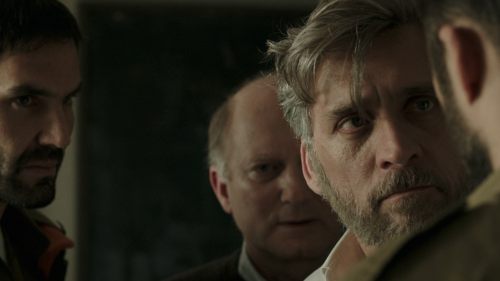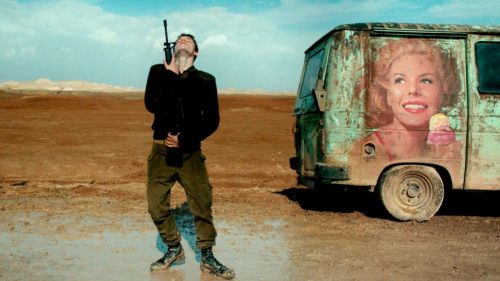After FOXTROT: A Crash Course In Israeli Cinema
Foxtrot is almost here. Get your tickets now!
On February 13th, 2018, Israel declared they would be boycotting the Israeli Film Festival in Paris due to their decision to screen Foxtrot, a film that depicts the Israeli army covering up the deaths of Palestinian teenagers. The film, which will soon be screening at the Alamo Drafthouse, is not the first time director Samuel Maoz has courted controversy. His 2009 film, Lebanon, was similarly met with boycotts and government push-back. Critics of the film felt that the movie would discourage young Israelis from participating in the country’s army.
Maoz is among a new generation of Israeli filmmakers making waves on the international scene. In a wide-range of genres and mediums, filmmakers are exploring the political and social tensions of living in Israel today, exploring how the personal and political intersect. While just an overview of voices, let’s take a look at five Israeli filmmakers working today in a quick crash course on Israel’s national cinema.

Danae Elon
Documentary filmmaker Danae Elon is an Israeli-American filmmaker who makes deeply personal films that blur the line between public and private lives. In her award-winning film P.S. Jerusalem, Elon goes against her late father’s wishes and relocates her young family from Brooklyn to Jerusalem. Deeply intimate, the film portrays the struggles of adjusting to life in Jerusalem, in particular, the growing tensions with her husband and her son’s burgeoning friendship with a Palestinian classmate. Elon’s follow-up, The Patriarch’s Room, has a lighter tone as it explores the mysterious disappearance of the Patriarch of the Greek Orthodox Church in Jerusalem after he was ousted as leader in 2005. With a much lighter tone than her previous film, Elon explores the nuances of the most powerful Church in Old Jerusalem and the politically fueled secrets held behind its large convent walls. The film explores the intersection of politics and spirituality, centered on the growing friendship that Elon develops with an exiled Greek monk desperate to find answers about his former mentor.

Ari Folman
In 2008, Folman took the world of animation by storm with his animated documentary, Waltz with Bashir. The film depicts Folman’s lost memories from the 1982 Lebanon war, told with diaristic candor and expressionistic visuals. Centered on a recurring nightmare that Folman has about the time he spent in the army, the whole movie takes on the atmosphere of a waking dream, as he attempts to piece together what happened to him over thirty years ago. Folman structures the film around these dreams, but also conversations with friends as he tries to reconstruct this dark period. The film uses a technique that is similar to rotoscoping and involves drawing over some real footage. Bathed in yellow night and cast in darkness, the film’s style casts a horrific spell, transforming beauty and movement into horrific renditions of war and violence. In 2013, Folman returned with his follow-up, The Congress, a much different film. Blending live action and animation, the film depicts the ethical considerations an aging actress faces after deciding to preserve her likeness digitally for the future. Folman’s next animated film, Where is Anne Frank, was announced last year.

Nadav Lapid
More than just one of the best Israeli filmmakers working today, Nadav Lapid may very well be one of the most exciting filmmakers in the world right now, period. From Policeman to From the Diary of a Wedding Photographer, Lapid’s filmmaking has a dark ironic edge as he deconstructs institutional power. His best-known film, The Kindergarten Teacher, explores the gradual disintegration of a titular teacher as she throws away life, responsibility, and obedience in order to support the burgeoning poetry gift of one of her six-year-old students. The film best reflects his sardonic sense of humor and his tenderness towards the struggles of women trying to operate compassionately within oppressive structures. Following it up with From the Diary of a Wedding Photographer, a forty minute film told as a series of vignettes from an Israeli wedding photographer, he pursues his investigations of obedience and control and the liberating power of transgression. His next film, a French co-production Synonyms, is slated for release later this year.

Aharon Keshales and Navot Papushado
Fear not genre fans, Aharon Keshales and Navot Papushado have got you covered! In 2010, the pair made their debut with Rabies - which quickly became a genre-fest favorite. Playing on the familiar tropes of the slasher genre, two siblings find themselves in an isolated nature reserve. After a psycho-killer shows up and goes after the sister, her brother goes on a quest to find help, only to stumble continually as he deals with the remnants of war and structural oppression. Their next film, Big Bad Wolves, made even more waves - shocking a wider audience eager to see what the duo would come up with next. In the film, the fate of three men is intertwined after a series of brutal murders. A revenge-fuelled vigilante comedy-drama, Aharon Keshales and Navot Papushado demonstrate their adept skill at using whiplashing tonal shifts as they explore the root of violence. The film put the pair on Quentin Tarantino’s radar after he called the film the best movie of 2013. Their next project, Once Upon a Time in Palestine, will be a genre-bending thriller about the birth of the Israeli state in 1948 British-ruled Palestine. Yet again, the filmmakers push themselves into new territories, in a story that will likely ruffle some feathers.

Dover Koshashvili
In 2001, Dover Koshashvili’s Late Marriage was among the key films to put Israeli cinema on the map for international audiences. Centered on the handsome, funny and smart 33-year-old bachelor Zaza, the film is a comedy that pits tradition against love. Starring the charismatic Israeli heartthrob, Lior Ashkenazi (who also stars in Rabies, Big Bad Wolves and Foxtrot), the film depicts a man expected to marry a young virgin, while he is in love with a young, divorced mother. The film won acclaim all over the world and has long been a perennial favourite in the “foreign film section” of any respectable video store or streaming site. Over the past decade and a half, Dover Koshashvili has continued to be one of the most exciting voices in Israeli cinema at home and beyond. In 2010, he even made an American film, Anton Chekhov’s The Duel, an adaptation of the titular text. His signature style blends erotic tension with a darkly tuned comedy, as characters face off against expectation and tradition with surprising results.


